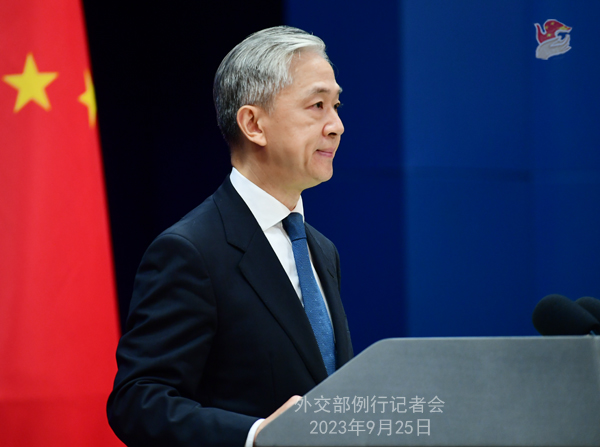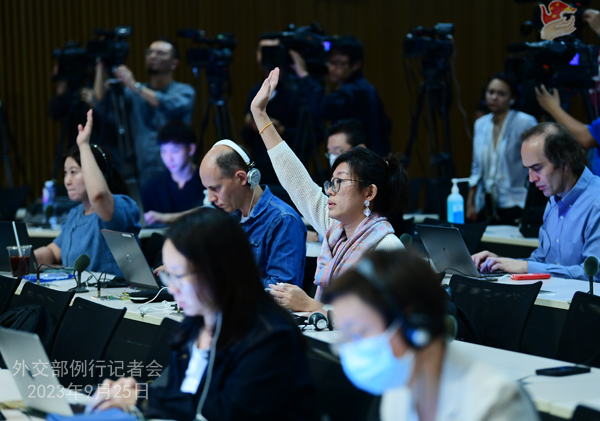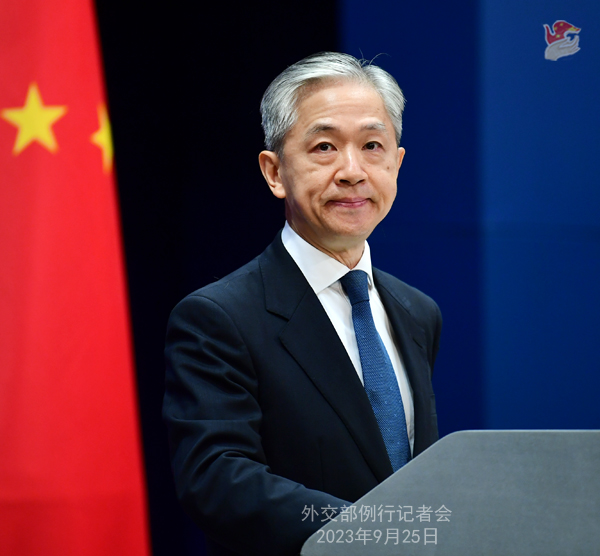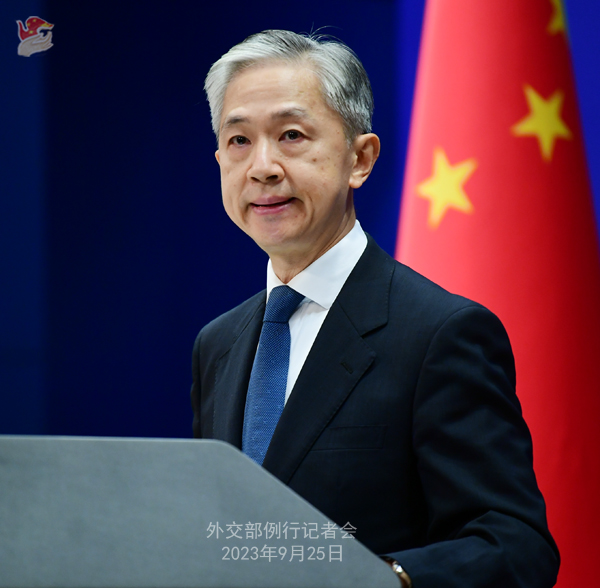| Foreign Ministry Spokesperson Wang Wenbin’s Regular Press Conference on September 25, 2023 |
| 2023-09-25 22:20 |
|
TASS: According to reports, the US and Viet Nam are in negotiation about the provision of large amounts of weaponry. The arms sale includes F-16 fighter jets. What’s your comment? Wang Wenbin: Asian countries share a desire for stability, cooperation and development. We hope that when advancing bilateral relations and conducting military cooperation, relevant countries will observe basic norms governing international relations, abandon hegemonic and Cold War mentalities, refrain from stoking confrontation and spurring arms race, and not jeopardize regional peace, stability, development and prosperity. CCTV: According to reports, the emergency humanitarian assistance provided by the Chinese government has reached Libya. Could you offer more information? Wang Wenbin: The people of China and Libya share a profound and long-standing friendship. After eastern Libya was hit by a deadly hurricane, China actively provided support for its relief efforts. On September 24, the disaster-relief supplies provided by the Chinese government reached the eastern Libyan city of Benghazi and were smoothly handed over to the Libyan side. The supplies include tents, blankets, first-aid kits, water purification equipment, diagnostic ultrasound systems, among others. China stands ready to work with the international community to continue supporting the Libyan people in overcoming the disaster and rebuilding their homes at an early date. China Daily: The World Intellectual Property Organization recently issued the Science and Technology (S&T) Cluster ranking of the Global Innovation Index. Three out of the world’s five biggest S&T clusters are in China—namely, Shenzhen-Hong Kong-Guangzhou, Beijing and Shanghai-Suzhou. Also, China has 24 of the top 100 S&T clusters worldwide—outnumbering all other countries for the first time. Do you have any comment on this? Wang Wenbin: We noted the WIPO report. Since the Global Innovation Index was launched in 2007, China has appeared more and more often on those charts, an indication of China’s continued progress in innovation-driven development. The National Bureau of Statistics of China recently released a report showing that China’s innovation-driven index in 2022 was 336.3, up by 15.5 percent over the previous year; and China’s total funding for research and development exceeded RMB 3 trillion for the first time, ranking the second in the world. As WIPO Director General Daren Tang noted, China has become an important contributor to global intellectual property work and successfully transformed itself into one of the world’s leading innovation, creativity and S&T hubs. You mentioned that some Chinese cities are among the world’s five biggest S&T clusters. This testifies to the success of China’s measures to encourage relevant regions to leverage their strength as reservoirs of innovation factors and increase their ability to innovate and boost economic growth. Innovation hinges on cooperation, openness and sharing. As President Xi Jinping stressed, China will stay committed to the win-win strategy of opening-up, keep advancing high-level opening-up, promote international exchange and cooperation on science and technology with greater openness, foster an open innovation ecosystem with global competitiveness and work with other countries to create an open, fair, just and non-discriminatory environment for scientific and technological advancement.
ZDF: About the commerce dialogue with the European Union today, what is China’s position on the question of the announced anti-subsidy investigation against Chinese electric vehicles imports, which Ursula von der Leyen mentioned some days ago? Wang Wenbin: About the specifics of the tenth high-level economic and trade dialogue between China and the EU, I would refer you to the competent authorities. China’s Ministry of Commerce has responded to the EU’s announced anti-subsidy investigation into Chinese electric vehicles. I would like to stress that China opposes all forms of trade protectionism. The action that the EU plans to take will disrupt the stability of global auto industrial and supply chains and will not serve anyone’s interests. China urges the EU to bear in mind the importance of the stability of global industrial and supply chains and the China-EU comprehensive strategic partnership, engage in dialogue and consultation with China, work with China to create a fair, non-discriminatory and predictable market environment for Chinese and European electric vehicle industries and jointly oppose trade protectionism. Bloomberg: There’s a ministry of foreign affairs working level meeting being held this week in Seoul between the Chinese, Japanese and the South Koreans, which I assume is a prelude to the trilateral meeting which is hopefully planned for later this year. What is China looking to achieve at this meeting? What do you hope the outcomes will be? Wang Wenbin: China, Japan and the ROK are neighbors and important cooperation partners. Closer trilateral cooperation serves the common interests of all three parties. China values the trilateral cooperation mechanism and actively supports the ROK’s chairmanship. According to my knowledge, the three parties are in contact about the high-level meetings of the trilateral cooperation. NHK: The Philippine government issued a statement earlier today condemning China’s measures around Huangyan Dao in the South China Sea. What is your response? Wang Wenbin: Huangyan Dao has always been China’s territory. China has indisputable sovereignty over the island and its adjacent waters and sovereign rights and jurisdiction over relevant waters. On September 22, a vessel of the Bureau of Fisheries and Aquatic Resources of the Philippines, without China’s permission, intruded into the adjacent waters of Huangyan Dao and attempted to enter its lagoon. China Coast Guard did what was necessary to block and drive away the Philippine vessel. The steps it took were professional and restrained.
CCTV: China’s Ministry of State Security released an article on September 20, which exposed the methods of US intelligence agencies to engage in cyber attack and espionage. The article also revealed that the US government started infiltrating Huawei headquarters’ servers in 2009 and has been monitoring them ever since. What’s China’s comment? Wang Wenbin: We condemn the US government’s irresponsible acts. This is yet another piece of evidence that the US government has been conducting massive cyber espionage against China on the one hand, causing enormous risks for China’s cyber security, while propagating disinformation about so-called Chinese hacking attacks. This is typical hypocrisy and political manipulation. In particular, the article revealed that the US government has been engaged in cyber espionage against Huawei since 2009. The US has long been suppressing Huawei and other Chinese high-tech companies on the grounds of national security. According to this article, even through cyber espionage, the US government still failed to find any “evidence” to justify that, which made it clear that the US government’s suppression of Chinese companies is not about national security, but about using illegal and unfair means to stop Chinese companies from succeeding when the US is not getting ahead in a normal competition. We hope that relevant countries will not be part of the US’s political coercion against Chinese companies. We hope they will uphold strategic independence and keep the business environment fair, open, inclusive and non-discriminatory by being unbiased and objective. Bloomberg: EU trade commissioner Dombrovskis is in China today. At Tsinghua University this morning, he gave a speech about Chinese trade practices and policies. He said that the lack of reciprocity in the level playing field from China coupled with wider geopolitical shift has forced the EU to become more assertive. What is your reaction to this speech? Do you think there’s a justification for these criticism of Chinese trade policy? Wang Wenbin: Let me say first that China continues to uphold the rule of law and protects the lawful rights and interests of individuals and organizations in accordance with the law. We will continue to provide a sound business environment that is market-oriented, law-based and up to international standards for the lawful operation of businesses of all countries in China. Let me also reemphasize that China is not a source of risk, but a staunch force for preventing and defusing risks. From safeguarding financial stability and curbing inflation to dealing with energy crises and realizing green transition, China is an important cooperation partner for the EU. To shut out China in the name of “de-risking” is to throw away opportunities, cooperation, stability and development. To do that is to create and spread risks, and no one would benefit from it. China and the EU need to join hands to resist and oppose moves that overstretch the concept of security and politicize economic and trade cooperation, and be the stabilizers that fend off risks and the engines that propel global economic growth.
TASS: Since the Nord Stream blast in late September last year, Germany, Denmark and Sweden have been investigating the incident for almost a year without reaching any clear conclusions. What’s China’s comment on the investigation process? Wang Wenbin: One year on, the probes into the Nord Stream blast seem to have proceeded very slowly. People wonder why the countries that pride themselves on being open and transparent have fallen silent over this. The security of vital infrastructure is a common concern of the international community. To find out the truth and release the findings of the investigations as soon as possible matters to the security of transboundary infrastructure and to international rule of law and justice. China supports carrying out objective, impartial and professional investigations into the blasts. We hope that relevant countries will be mindful of their responsibility for truth, and readily respond to the doubts and concerns of the international community, so as to bring truth to light at an early date. Reuters: The Philippines on Sunday accused China Coast Guard of installing a floating barrier in the disputed area around Scarborough Shoal, and Manila’s Coast Guard has strongly condemned the barrier being installed in that area. Did China install that floating barrier as reported and how does China respond to this particularly? Wang Wenbin: I already made clear China’s position on this. Bloomberg: Just follow up on my earlier question. Do you reject the accusation by EU commissioner Dombrovskis that China is providing an unfair and unlevel playing field for European companies in this country? It seems to be the basis of the discussions that are going on right now. Is it China’s position that China provides a level playing field for European companies here? Wang Wenbin: I shared China’s position just now. China is a country under the rule of law. As we advance law-based governance on all fronts, we will continue to promote high-level opening up. Reuters: A follow-up on the EU trade commissioner’s remarks. Mr. Dombrovskis mentioned that China has created a more politicized business environment via its new laws such as the new foreign relations law as well as the updated anti-espionage law, which are the developments that worry businesses to come here to China, to look for new opportunities. He also said that China could do a lot to help reduce the EU’s perception of risk. How does China respond to these remarks? Wang Wenbin: Regarding the counter-espionage law and the law on foreign relations, China has made clear its principled position on multiple occasions. Let me say again that all law enforcement and judicial activities in China are carried out based on facts and law. Companies that conduct lawful operation have nothing to worry about. We encourage and support normal exchanges and cooperation. China is a pleasant place to live and work for all foreign nationals and organizations who abide by Chinese laws and regulations.
|
 | ||||||||||||
 | ||||||||||||
|




